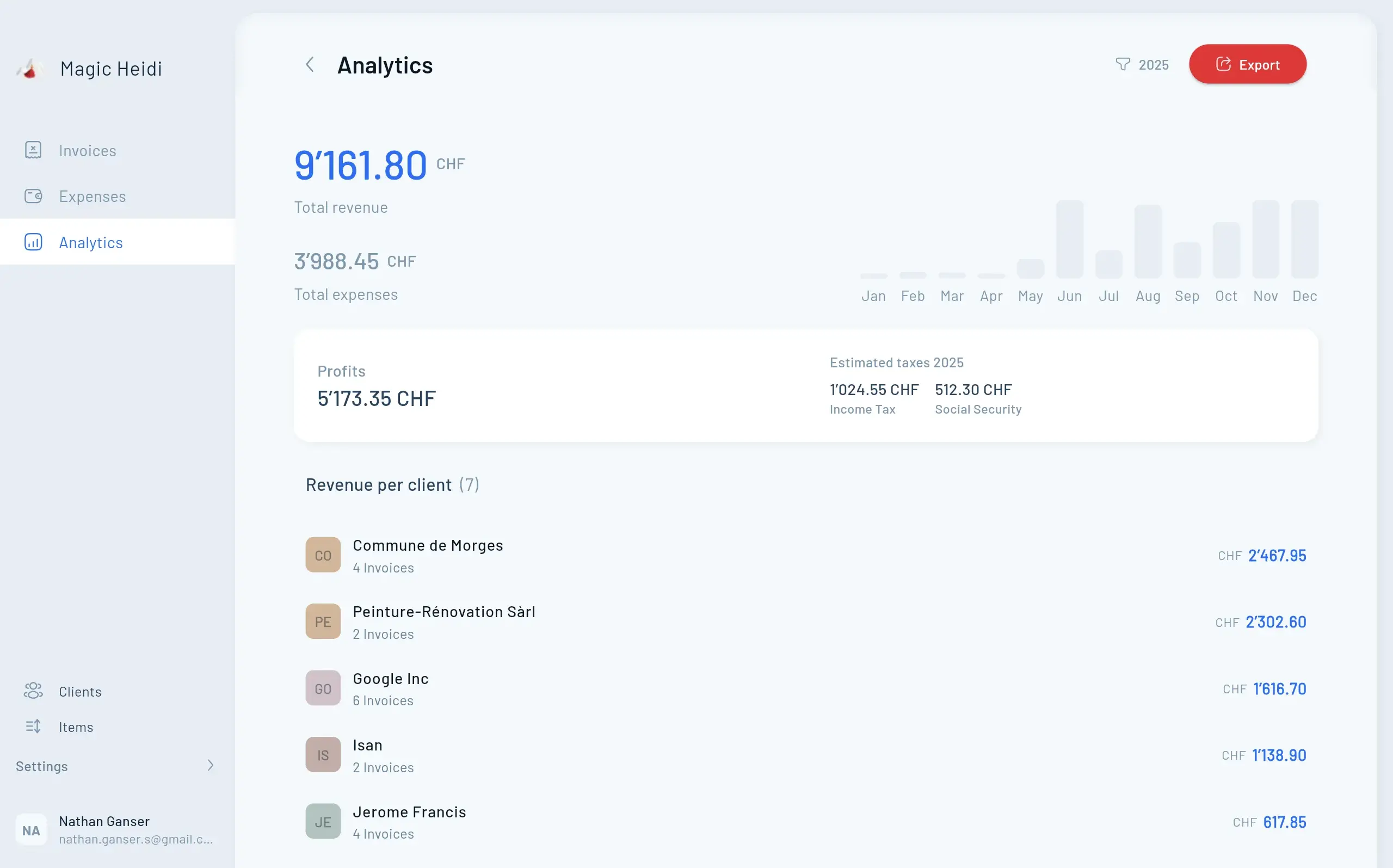Revolut Business Switzerland Review (2025):
Pricing, Swiss IBAN, Fees & The Freelancer Verdict
A Swiss-focused review covering CHF plan pricing, CH virtual IBAN & migration, key June 2025 dates, transfer fees, and who Revolut Business fits best.

If you’re a Swiss freelancer or micro‑SME, Revolut Business can be a strong “modern finance stack” — especially if you invoice in CHF but pay contractors, tools, or taxes across borders in EUR/USD/GBP. But in 2025, the decision hinges on two Switzerland-specific realities:
- Pricing changed (effective on or after 11 March 2025, depending on your billing cycle), and the entry plan is paid.
- The Swiss IBAN situation requires attention: Revolut has moved Swiss customers through migration to Revolut Bank UAB and now commonly provides a Swiss virtual IBAN via Swiss infrastructure. There were also critical dates in June 2025 that affected some customers’ ability to receive payments on older CH IBANs.
This guide is written to help you decide quickly and confidently — with the key numbers, “gotchas,” and a simple checklist for switching.
Note on accuracy: Revolut can update fees, allowances, and plan features. Always confirm the final pricing and allowances in your Revolut Business app and on Revolut’s official pages before committing.
Swiss freelancer-friendly summary
Use this to decide in 60 seconds.
Revolut Business is a good fit in Switzerland if you…
- Send/receive in multiple currencies (CHF + EUR/USD/GBP) and want to reduce FX admin and friction.
- Need a modern app experience with cards, team spending controls, and cleaner exports for bookkeeping.
- Want to consolidate international payments into one tool (instead of juggling a Swiss bank + separate FX service).
Revolut Business may not be ideal if you…
- Need a “classic Swiss bank” experience for every edge case (some businesses rely on specific local workflows).
- Are cash-heavy (cash deposits aren’t Revolut’s strength).
- Want a fully free business account (Revolut Business plans are paid in CH).
Revolut Business plans & pricing in Switzerland (CHF) — what changed in 2025
Fees are the first filter. Allowances should be verified in-app.
Revolut’s Help Center states that new business pricing applies on the next billing cycle on or after 11 March 2025, with the following monthly fees for Switzerland:
- Basic: CHF 10 / month
- Grow: CHF 40 / month (or CHF 480 / year)
- Scale: CHF 150 / month (or CHF 1,800 / year)
Source: Revolut Help Center — New business pricing plans
https://help.revolut.com/en-CH/business/help/account-management-plans-and-billings/billings-and-allowances/new-business-pricing-plans/
“From CHF …” vs “CHF …” — why you may see different numbers
You may still see marketing pages that show pricing like “from Fr 120/month” for Scale. In practice, Revolut’s Help Center is typically the most precise reference for Switzerland-specific billing changes and timelines, including the CHF 150/month Scale fee for many customers after the 2025 update. If you’re comparing tabs and seeing mismatches, treat the in-app price at checkout + Help Center as the source of truth.
What you’re really paying for
For many Swiss freelancers, the monthly fee is justified if it replaces:
- separate FX conversions,
- separate international transfer tools,
- manual reconciliation and receipt chasing,
- or extra cards/controls for contractors.
But if you’re CHF-only and your business is simple, the monthly fee can feel unnecessary compared to a low-cost Swiss incumbent account.

Revolut Business fees that matter
The decision usually comes down to transfer fees, FX rules, and operational fit.
The fees that usually decide “worth it or not” for Swiss freelancers are:
- Transfer costs after your plan allowance
- FX conversion costs/limits (what’s included vs what’s charged)
- Operational fit: local rails compatibility, invoicing flows, recurring payments, and bookkeeping exports
Transfer fees after allowances (important for micro-businesses)
Revolut lists the following Business transfer fees when you exceed your plan’s included allowance:
- Local transfer (outside allowance): Fr 0.3
- International transfer (outside allowance): Fr 7
Source: Revolut Help Center — Transfer fee (Business)
https://help.revolut.com/en-CH/help/receiving-payments/sending-money-to-an-external-bank-account/transfer-fee/business/
How to use this in real life:
If you send many small transfers every month (e.g., frequent supplier payouts), even “small” per-transfer fees can add up quickly once you exceed your included allowance. In that case, choosing the right plan is less about the monthly fee and more about avoiding repeated overage charges.
FX: where Revolut Business often wins (and where to double-check)
Revolut’s value proposition for Swiss freelancers usually shows up when you:
- invoice CHF but pay EUR subscriptions,
- receive EUR from EU clients,
- pay overseas contractors,
- or regularly convert CHF↔EUR at scale.
However, FX allowances and fair-usage limits can vary by plan and can change. Confirm your specific plan’s monthly included FX and overage pricing in the app and Revolut’s plan pages.
Swiss IBAN in Revolut Business: what you actually get in 2025
CH IBAN vs virtual CH IBAN, PostFinance infrastructure, and migration implications.
If you’re operating in Switzerland, “Do I get a Swiss CH IBAN?” is not a detail — it’s the foundation for getting paid smoothly, setting up client standing orders, and avoiding “we can’t pay that IBAN” conversations.
Why “PostFinance” can appear in your Swiss account details
Revolut explains that PostFinance may appear in Swiss account details because Revolut uses PostFinance infrastructure to provide a Swiss IBAN, while funds are held by Revolut Bank UAB (not PostFinance).
Source: Revolut Help Center — PostFinance visible in my Swiss account details
https://help.revolut.com/en-CH/business/help/setting-up-an-account/managing-my-currency-accounts/postfinance-visible-in-my-swiss-account-details/
What this means for you: seeing PostFinance in the details is typically an infrastructure/rail detail, not “your money is at PostFinance.”
Swiss virtual IBAN (and why migration matters)
Revolut states that Swiss customers can access a CH virtual IBAN once migrated to Revolut Bank UAB. Migration happens in phases and may require additional documents. Not migrating can lead to disruptions if an IBAN becomes non-operational.
Source: Revolut Help Center — CH Business Migration FAQ
https://help.revolut.com/en-CH/business/help/account-management-plans-and-billings/ch-business-migration-faq-1/
Practical takeaway for Swiss freelancers:
Before you put a Revolut IBAN on invoices, make sure:
- your account is migrated if required,
- your current Swiss IBAN details in-app are the ones you’ll keep using,
- and you understand whether you have a “classic” CH IBAN or a virtual CH IBAN mapped to your account.
Critical June 2025 dates (CH IBAN visibility & inbound payment disruptions)
Revolut notes that on 16 June 2025, some Swiss customers who hadn’t joined Revolut Bank UAB couldn’t view their CH IBAN. Incoming payments to older CH IBANs were processed until 30 June 2025, after which they were returned to sender.
Source: Revolut Help Center — Credit Suisse IBAN deactivation
https://help.revolut.com/en-CH/help/transfers/inbound-transfers/how-to-receive-money-from-another-bank/what-account-details-should-i-use-to-transfer-money-to-my-revolut-account/question-credit-suisse-iban-deactivation/
What you should do now (even if 2025 already passed)
- Open your Revolut Business app → verify what IBAN details are currently shown.
- If you invoice clients with saved beneficiary templates, send updated bank details and ask them to update their payee records.
- If you used older CH IBAN details, ensure they are no longer referenced on invoices, QR bills, website footers, email signatures, and payment portals.
Pricing & allowance snapshot (Switzerland)
Fee-first overview using Revolut Help Center CHF pricing. Allowances vary—verify in-app.
| Plan | Monthly fee (CH) | Best for | Watch-outs |
|---|---|---|---|
| Basic | CHF 10/mo | New freelancers testing Revolut Business; light transfer volume | Can become expensive if you exceed transfer/FX allowances often |
| Grow | CHF 40/mo (CHF 480/yr) | Active freelancers and tiny teams with regular EUR/USD activity | Validate included allowances vs your monthly transfer count |
| Scale | CHF 150/mo (CHF 1,800/yr) | High-volume payouts, more complex operations, serious multi-currency needs | High fixed cost; only worth it if you’ll use the higher allowances/features |
Real-world fit: who Revolut Business is best for in Switzerland
Three common scenarios and what to watch.
1) The “Swiss freelancer + EU clients” scenario
You invoice in CHF or EUR, receive payments from EU customers, and pay EU tools.
Revolut Business can simplify:
- receiving non-CHF payments,
- holding multiple currencies,
- converting when rates are favorable (within plan rules),
- and reducing the bookkeeping mess of many cross-border charges.
Plan selection tip: If you make frequent international transfers, pay attention to overage fees (local Fr 0.3 / international Fr 7 outside allowance).
2) The “micro-agency with contractors” scenario (1–10 people)
If you pay contractors monthly and want tighter spending controls, Revolut Business can help with:
- cards for team members,
- clearer transaction categorization,
- cleaner exports to your bookkeeping flow.
Where it can disappoint: If your operations need highly specific Swiss banking products/workflows, you may keep a Swiss bank as your “core” account and use Revolut as the multi-currency layer.
3) The “expat founder in Switzerland” scenario
Expats often prioritize:
- multi-currency,
- international transfers,
- and a familiar app-first UX.
Key Switzerland-specific check: confirm your Swiss IBAN status and migration to Revolut Bank UAB to avoid inbound payment surprises.
Keep a Swiss local anchor, add a multi-currency layer
Many freelancers pair a Swiss incumbent account (for local stability) with a fintech tool for cross-border payments and FX.

When a Swiss bank account is the better primary choice
Revolut can be excellent, but not always the default for every Swiss business.
Revolut Business can be excellent, but it’s not automatically the best default for every Swiss business.
Choose (or keep) a Swiss bank as your primary account if you need:
- a deeply Swiss-native setup for every edge case (and immediate local support expectations),
- cash-heavy operations (Revolut is typically not “cash deposit friendly”),
- or you simply don’t benefit from multi-currency/FX often enough to justify a monthly fee.
Swiss baseline: PostFinance (for compatibility and simplicity)
PostFinance lists a CHF business account at CHF 5/month, which sets a practical “incumbent baseline” for Swiss compatibility-focused banking.
Source: PostFinance — Business account CHF
https://www.postfinance.ch/en/business/products/payment-transactions/accounts/business-account-chf/
Competitor snapshots (Switzerland): Revolut Business vs PostFinance vs Wise
You don’t need a winner. You need the right tool mix for how you earn and pay.
Revolut Business (best for multi-currency operations)
Strengths
- Multi-currency holding and spending
- Modern app experience and admin controls
- Clearer cross-border workflows than many incumbents
Trade-offs
- Paid plans in Switzerland
- Must take the Swiss IBAN/migration topic seriously
PostFinance (best for Swiss-default banking)
Strengths
- Strong Swiss local compatibility and familiarity
- Often a straightforward choice for CHF-only businesses
Trade-offs
- International payments/FX can be less competitive vs fintech-first options (varies by use case)
Wise (best as an FX/transfers benchmark)
Wise is widely known for transparent pricing and low-fee international transfers, often used alongside a Swiss bank rather than replacing it entirely.
Example Switzerland overview (general): https://www.expatica.com/ch/finance/money-management/wise-review-switzerland-2173473/
Practical approach many freelancers use:
- Swiss bank or PostFinance for “local base”
- Revolut Business or Wise for cross-border payments and FX optimization
Revolut Business in Switzerland (2025)
Do I get a Swiss CH IBAN with Revolut Business?
Swiss customers can have Swiss account details, and Revolut references the availability of a CH virtual IBAN for Swiss customers after migration to Revolut Bank UAB (migration may require additional documentation). Source: https://help.revolut.com/en-CH/business/help/account-management-plans-and-billings/ch-business-migration-faq-1/
What’s a “virtual CH IBAN”?
A virtual IBAN typically maps to an underlying account while still presenting a CH IBAN for local use. For most freelancers, what matters is whether it works reliably for receiving payments and whether clients can pay it without issues. Confirm the exact details shown in your Revolut Business app.
What happened to the old CH IBAN? (June 2025 timeline)
Revolut states: - 16 June 2025: some Swiss customers who hadn’t joined Revolut Bank UAB couldn’t view their CH IBAN - Incoming payments to old CH IBANs were processed until 30 June 2025, then returned to sender. Source: https://help.revolut.com/en-CH/help/transfers/inbound-transfers/how-to-receive-money-from-another-bank/what-account-details-should-i-use-to-transfer-money-to-my-revolut-account/question-credit-suisse-iban-deactivation/
Do I need to migrate to Revolut Bank UAB?
Migration is a key requirement for certain Swiss IBAN functionality and continuity. Revolut’s CH business migration FAQ explains that migration happens in phases and may require additional documents. Not migrating can result in disruptions if an IBAN becomes non-operational. Source: https://help.revolut.com/en-CH/business/help/account-management-plans-and-billings/ch-business-migration-faq-1/
Are CHF transfers “local”? What does Revolut charge after allowances?
Revolut lists transfer fees outside allowances as: - Local transfer: Fr 0.3 - International transfer: Fr 7 Source: https://help.revolut.com/en-CH/help/receiving-payments/sending-money-to-an-external-bank-account/transfer-fee/business/
Why do I see PostFinance in my Revolut Swiss account details?
Revolut explains this is due to PostFinance infrastructure being used to provide a Swiss IBAN, while funds are held by Revolut Bank UAB. Source: https://help.revolut.com/en-CH/business/help/setting-up-an-account/managing-my-currency-accounts/postfinance-visible-in-my-swiss-account-details/
Is Revolut Business suitable for cash-heavy businesses?
Generally, fintech accounts are not optimized for regular cash deposits. If your business regularly receives cash, a Swiss incumbent account is typically the safer primary setup, with Revolut used only for international and card-based spending where it adds value.
“Before you switch” checklist (Swiss freelancer edition)
Avoid the most common inbound payment disruptions.
Use this to avoid the most common payment disruptions:
- Confirm your current Revolut Business IBAN details in-app (and whether you have a CH virtual IBAN).
- Check migration status (Revolut Bank UAB) and complete any requested steps/documents.
- Update invoice templates (PDF templates, accounting tool templates, website footer, email signature).
- Update saved payees with key clients (ask them to update beneficiary details in their e-banking).
- Review your transfer volume: estimate monthly local/international transfers to choose the plan that avoids overage fees.
- Map your currencies: list the currencies you receive/pay and how often you convert CHF↔EUR, CHF↔USD, etc.
- Export test: run a month of transactions and confirm your bookkeeping workflow (CSV exports, attachments, reconciliation habits).
- Keep a fallback account (optional but smart): for many Swiss freelancers, a Swiss bank account remains a stable “local anchor,” especially during transitions.
Should you choose Revolut Business in Switzerland in 2025?
A simple decision rule.
Choose Revolut Business if you’re a Swiss freelancer or micro‑SME that:
- works across borders,
- needs multi-currency support,
- and will actually use international transfers + FX enough to justify the monthly fee.
Be cautious if:
- you’re CHF-only,
- need cash handling,
- or want maximum “traditional Swiss bank” predictability for all edge cases.
The biggest Switzerland-specific success factor is simple: treat the Swiss IBAN + migration step as non-negotiable before you rely on Revolut for client payments.
Ready to decide?
Verify your Swiss IBAN details and migration status first—then choose a plan based on your real transfer & FX needs.